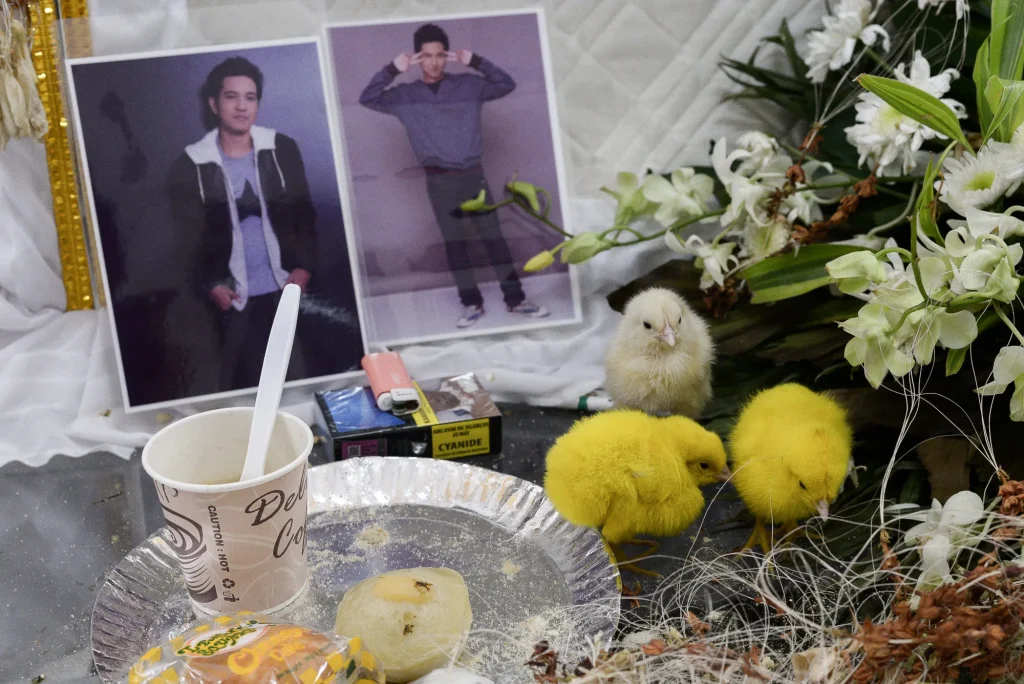Nov 23, 2022, Jairo Bolledo
MANILA, Philippines – A Caloocan court has convicted Patrolman Jefrey Perez for torture and planting of evidence in relation to the cases of drug war victims Carl Angelo Arnaiz and Reynaldo “Kulot” de Guzman.
“WHEREFORE, premises considered the accused, PO1 JEFREY S. PEREZ is hereby found GUILTY beyond reasonable doubt for all the crimes charged against him,” Caloocan City Regional Trial Court Branch 122 Presiding Judge Rodrigo Pascua Jr. said in a 36-page decision dated November 10.
In the Arnaiz case, the court meted the following sentences to Perez:
- Violation of sections 4 and 14 of Republic Act No. 9745 or Anti-Torture Act of 2009: Penalty of six months of arresto mayor as minimum, to four years and two months of prision correccional medium as maximum
- Planting of evidence under section 29 of Republic Act No. 9165 or Comprehensive Dangerous Drugs Act of 2002: Penalty of two terms of life imprisonment, in addition to absolute perpetual disqualification from any public office
- Planting of evidence under section 38 of Republic Act No. 10591 or Comprehensive Firearms and Ammunition Regulation Act: Penalty of reclusion perpetua
In the De Guzman case, the court meted the penalty of reclusion perpetua to Perez for violation of sections 4 and 14 of the Anti-Torture act, in relation to section 5(a) of Republic Act No. 8369 or Family Courts Act of 1997.
The Caloocan court also ordered the cop to pay the Arnaiz and De Guzman families P1 million each for moral damages, and another P1 million each for exemplary damages. The rate of 6% per annum is also imposed on the monetary reward from the decision’s date until fully paid.
“Moreover, pursuant to Section 18 of Republic Act No. 9745, the victim’s heirs, are likewise entitled to claim for compensation as provided under Republic Act No. 7309 for an amount to be determine by the government agency concerned,” the court added.
The other accused, Patrolman Rocky Arquilita died of suspected hepatitis in 2019, while in jail. The court issued the warrant of arrest against Perez and Arqulita.
Since Arquilita died during the trial, the cases against him were dismissible, the court said: “At the outset, the death of PO1 Arquilita during the pendency of the trial renders dismissible the criminal cases against him.”
The decision
In explaining the decision, the court said they relied on the accounts of witness Arnold Perlada and other circumstantial evidence from the prosecution. The court said Perlada’s narrations proved that the crimes were committed by the accused.
“The Court holds that the foregoing narrations lead to a reasonable hypothesis that the evidence of physical torture sustained by the victims, were perpetrated by no other persons than the accused in this case,” the decision read.
On the torture of Arnaiz, the court said although the witness said he did not see the accused punching or hitting Arnaiz, torture was still present because the torture is usually done in a concealed location.
“As pointed out by the prosecution, torture is perpetrated under clandestine conditions, and is done away from the public eye. Considering that the accused are Caloocan police and were in fact on board the Caloocan police mobile patrol car, by no stretch of imagination could they have taken custody of the herein victims, elsewhere,” the court said.
The court said the cops committed the crime of planting illegal drugs and ammunition to make it appear that there was a shootout with Arnaiz.
“The circumstances above-mentioned appreciated in its totality constitute an unbroken chain that impel this Court to arrive into a fair and reasonable conclusion that herein accused committed the crime of planting of evidence to incriminate Carl in the violation of RA 9165, and the planting of firearm with ammunitions near the body of Carl, to make it appear that he engaged in a shootout during a hot pursuit operation, in an attempt to cover up the intended killing,” the decision said.
Even though Arquilita had died, the charges against Perez remained because of the presence of conspiracy. According to the court, the idea of conspiracy was there when the two cops committed the crimes.
“Clearly, the foregoing acts of the accused are indicative of unity of criminal design, joint purpose, concerted action, and concurrence of sentiments as in conspiracy,” the court said.
Teen deaths in Duterte’s drug war
Arnaiz was killed in what the Philippine National Police (PNP) initially claimed as a shoout supposedly started by the 19-year-old. Police claimed that cops were trying to arrest him for supposedly robbing a cab driver on August 18, and that the teen supposedly fired first. They also alleged that they found drugs on him.
The Public Attorneys Office’s autopsy painted a different picture: Arnaiz was handcuffed, beaten up, and then killed. The taxi driver who allegedly got robbed by Arnaiz also later said that he was forced to provide a false affidavit against Arnaiz.
A PNP Internal Affairs Service investigation into the controversial case corroborated the PAO findings, that the two Caloocan cops “intentionally killed” Arnaiz.
The 14-year-old De Guzman, who has last seen with Arnaiz in Cainta, Rizal, was found dead over 100 kilometers away, in a creek in Barangay San Roque, Gapan City, Nueva Ecija, weeks after Arnaiz’s death. De Guzman had 30 stab wounds.
The Arnaiz and De Guzman murder cases are still pending before a Navotas court.
This is the latest conviction of high-profile cases in the bloody drug war, after the Kian delos Santos case. In 2018, a Caloocan court convicted three cops for Delos Santos’ killing. – Rappler.com

